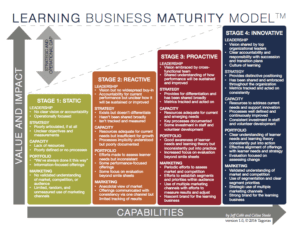Why is the concept of the “learning business” and the types of organizations it describes so important? It’s something that many of us in the business of lifelong learning haven’t probably thought too much about but understanding the relationship between “learning” and “business” is becoming increasingly critical to ensure your learning business will thrive in the years ahead.
In this episode of the Leading Learning podcast, Celisa and Jeff discuss the topic of the learning business including what it is, why it’s such an important concept, and the important link between both learning and business.
To tune in, just click below. To make sure you catch all of the future episodes, be sure to subscribe by RSS or on iTunes. And, if you like the podcast, be sure to give it a tweet!
Listen to the Show
Read the Show Notes
[00:18] – A preview of what will be covered in this podcast where Celisa and Jeff discuss why the learning business is such an important concept.
[00:37] – Thank you to Castle, which is the sponsor of the Leading Learning podcast for the second quarter of 2017. Castle is an accomplished full-services certification and licensure testing company that also offers its clients a variety of learning solutions capabilities. With an expert team of testing and instructional design professionals and a thirty year history of excellence in it’s field, Castle understands what it takes to develop and deliver quality learning and certification programs.
[01:13] – Highlighted Resource of the Week – an informal curriculum on the topic of the Learning Business – new post on the Tagoras site that brings together the various episodes we have done on the podcast along with various notes and other resources.
What Is (and Is Not) Considered a Learning Business?
[01:45] – Celisa highlights the two fundamental criteria an organization has to meet to be considered a learning business:
- The fundamental reason for its existence has to be to generate revenue through selling learning and education experiences to a target audience. In most cases, this means net positive revenue or profit.
- It has to self-identify as a business, meaning the majority of the people working in the business recognize that revenue generation is fundamental reason for the businesses existence.
[02:41] – Jeff discusses what is not considered a learning business:
Most corporate training does not fall in the learning business category. While corporate training can and should contribute to business success, it is typically a cost center, and its audience is primarily internal to the company.
Traditional academic institutions, for the most part, are not considered “learning businesses.” Even to the extent that these organizations do generate positive net income, they usually don’t self-identify with revenue generation being a fundamental reason for their existence.
Continuing education and extension programs tend to be one of the major exceptions in the academic worlds. They tend to identify more as business, and may even be run more like private training and education companies –so they would classify as learning businesses.
Also, most trade and professional associations are learning businesses or, at the very least, run learning businesses within their overall business. And we feel that is true whether an organization is selling education and training directly, or it provides access to learning opportunities – whether formal or informal – as part of the benefit of membership. In either case, learning is driving revenue, and should be treated as a business.
The “Why” of the Learning Business
[04:26] –Why is the concept of the learning business and the types of organizations it describes so important now?:
- The need and demand for lifelong learning has shifted dramatically
- The nature of employment has changed with people switching jobs and even careers much more often.
- Many more people are freelancing than ever before.
- Nature of work is changing rapidly
- The speed at which new ideas and innovations can spread means it can take more effort than ever to keep up.
- Employers recognize this and are increasingly looking for people who show signs of being capable lifelong learners –see our related podcast episode, The Mainstreaming of Lifelong Learning about a special report from The Economist highlighting lifelong learning as an “economic imperative”.
- Technology is making many jobs obsolete or changing the set of skills and knowledge required for them – we are only at the very beginning of what’s going to be possible with artificial intelligence, robotics, and all of the various forms of automation that new technologies are bringing with them.
[08:50] – All of this is disruptive, to say the least, and it is coming as a real jolt to many people. In his recent book, Thank You for Being Late: An Optimist’s Guide to Thriving in the Age of Accelerations, Thomas Friedman quotes Eric Teller, the CEO of Google’s X research and development lab, in writing:
There is a whole group of people – judging from the 2016 US election – who “did not join the labor market at age twenty thinking they were going to have to do lifelong learning” – and they are not happy about it.
This is really something of a crisis in what we refer to as “the other 50 years” and it points to why the idea of the learning business is so important right now.
People need guidance and many—probably most—of us aren’t really prepared to be truly active and effective lifelong learners.
We need organizations and individuals who can help lead the way.
That’s the “learning” part of the equation, but we have paired learning with the term “business” and we feel that is equally important.
In some ways, by focusing on “business” we’re acknowledging what, at least in the U.S., is a political reality. We’re not likely to see a lot of new government money pouring in to address the challenges of the other 50 years. We’ve already got enough struggles with ensuring that pre-K through 12 and higher education spaces are properly funded.
That’s not to say that the government shouldn’t play a role—there does need to be more government investment—but the reality is that private sector organization (both for profit and nonprofit) are the ones that carry most of the weight.
[13:36] – Another reason why we emphasize “business,” is that, in our opinion, there is a real need to bring more of a business mindset and business practices to the market for lifelong learning, continuing education and professional development.
By that, we mean five things:
- Organizations that serve the market need to be much more strategic.
- They need to be much operationally disciplined and attuned to best practices (i.e. strategy formulation, learning, and marketing).
- They need to be more entrepreneurial and innovative.
- They need to have greater accountability and be able to demonstrate impact and results.
- They need operate in a financially sustainable way – in most cases, this means making a profit. There is a growing realization that education is perhaps the key source of non-dues revenue (but you need to be doing everything in the above bullets if you expect to thrive).
[19:52] – No matter what kind of organization you are, your core training and education should be producing a significant margin for you. You have to think like a business in order for this to happen.
All of this underpins our Learning Business Maturity Model – a tool to help put in to place the domains of knowledge and the mastery of the domains in a way that’s going to lead your learning business to be proactive, ultimately innovative, and fully financially sustainable.

[22:16] – A recap of what was discussed and why the concept of a learning business is so important. It is also emphasized that while there are challenges related to lifelong learning, continuing education, and professional development, there are also tremendous opportunities.
[24:15] – Wrap Up
Thanks again to Castle, a full service certification and licensure testing company that also offers its clients a variety of learning solutions capabilities, for sponsoring this episode of the Leading Learning podcast.
If you are getting value from the Leading Learning podcast, be sure to subscribe by RSS or on iTunes. We’d also appreciate if you give us a rating on iTunes by going to https://www.leadinglearning.com/itunes.
Also, please tell others about the podcast. Go to https://www.leadinglearning.com/share to share information about the podcast via Twitter, or send out a message on another channel of your choosing with a link to https://www.leadinglearning.com/podcast.
[26:17] – Sign off
For other episodes related to the concept of the learning business, check out:


Leave a Reply